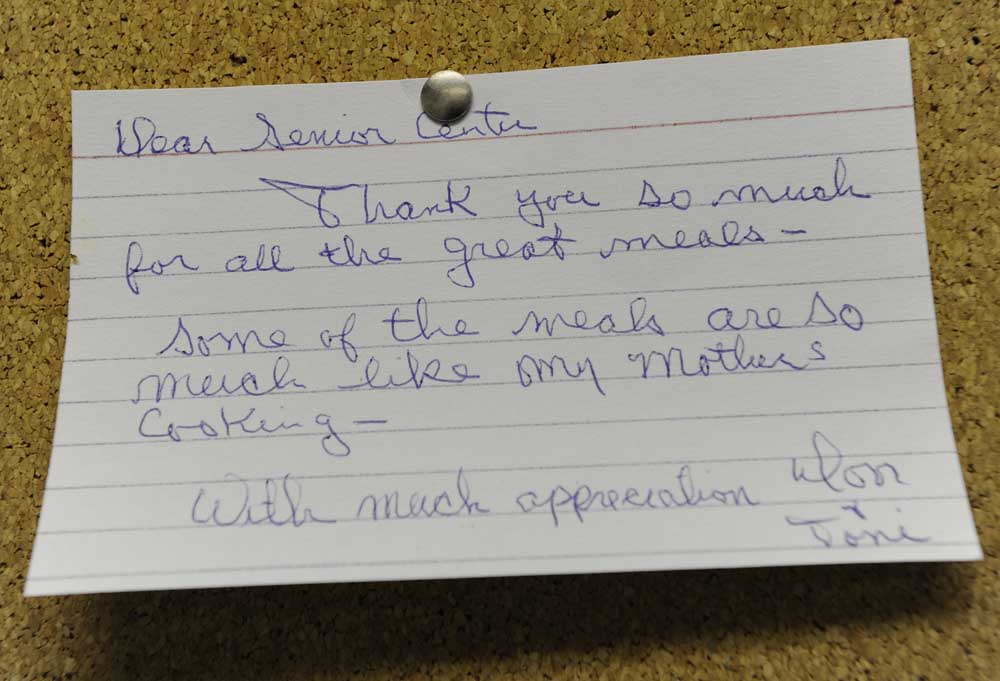Redmond senior meal program in a pinch
Published 12:00 am Thursday, July 24, 2014

- A handwritten note from a recipient of home-delivered meals thanking the kitchen staff for the work they do is on display in the kitchen at the Redmond Senior Center.
REDMOND — One of Sue Barker’s biggest fears is picking up a newspaper and hearing about a homebound Redmond senior citizen who died of malnutrition.
“I’d have to jump off a bridge. I just can’t imagine how horrible that would be,” said Barker, manager of Redmond Senior Center.
Since the federal sequestration cut funding for senior nutrition programs last year, the center has been dipping into its savings to feed all of the Redmond-area seniors who either qualify for home-delivered meals or come to the noon meal offered Monday through Friday at the senior center.
Redmond Senior Council, the nonprofit that runs the center and its programs, has spent nearly 20 percent of its savings in the past six months to meet the shortfall , a practice it acknowledges is unsustainable.
“We’ve been told we should cut the number of days a week we offer meals or set up a waiting list, but we just don’t feel like we can do that to our seniors,” said Fern Young, council president. “But we really need help, doggone it, if we are going to keep serving everyone who needs it.”
Redmond’s trouble came about in a double-whammy beginning with the new year, according to Matt Verdieck, executive officer of Central Oregon Council on Aging. When he was appointed to his job six months ago, he realized that, while senior nutrition programs receive a finite amount of money annually, Central Oregon meal sites had not been held to any kind of budget. Then sequestration cut an average of 15 percent of funds to the programs.
“It’s not an open-ended budget,” Verdieck said. “The state (which receives federal funding for the programs) says we have this much to spend in all of our counties and we have to hold the sites to those maximums. Those caps have always been there, but it’s my understanding the sites didn’t operate with them in the past because there was no need.”
Budget maximums should have been included in the agreements with all the meal sites but weren’t, he said.
Redmond’s numbers for home-delivered meals have gone up considerably, he said, but overall funding has been flat for some time and is now reduced.
“If we raise Redmond’s maximum, we have to take away from another site,” Verdieck said. “We try to be as equitable as we can, but Redmond is the only one that has outgrown its funding cap.”
His organization operates some of the meal sites in the region and allocates funds to the rest.
According to Barker, Redmond’s numbers for meals served at the center have remained flat or slightly declined, but the delivered meals have doubled, and on some days, tripled, since 2012 when the Redmond Senior Council took over the program.
The Redmond Senior Center has three employees, Barker and two kitchen staffers. It operates in a city-owned building and uses income from renting spaces inside the center to pay its utilities and building upkeep. Funds for the senior meal program come from private donations and the federal funds allocated by the Central Oregon Council on Aging.
Users who pay toward the $3.50-per-meal costs are sporadic, Barker said. One day last week, there were 35 patrons in the center for the noon meal and $15 in the till. Legally, the meal site must serve any senior who asks, regardless of whether they contribute. Some of the on-site patrons are probably able to pay at least some of their meal costs, Barker said, but most do not.
“Some seniors see it as a kind of entitlement, and I don’t think they understand how much we struggle to pay for it all,” she said.
Barker has applied for some grants for the senior center in the past, but most of those funds went to repairs for the building and kitchen equipment. She said she would like to get out into the community more to appeal for help for the meal programs, but running the center can make it hard to break away.
The Redmond center has established a program it calls “Entreé,” where businesses or organizations that donate to the meal program are acknowledged in materials distributed to the patrons and are encouraged to have staff or members serving or visiting during meal times and promoting their business or organization.
So far, the response has been underwhelming, Barker said. A recent Redmond Chamber of Commerce event at the center yielded only two new participants in the sponsorship program.
The Redmond center’s choice to refrain from cutting service or staffing is a business decision that leads to hard choices, Verdieck said, one that is within its rights to make.
“Ultimately, there’s more demand than funding,” he said. “Even if Redmond’s demand (for meals) continues to grow, our total amount (to distribute) doesn’t increase.”
After the sequestration, members of Congress voted to restore some, but not all, of the funding for the senior nutrition program, but the funds haven’t trickled down through the state to the regional organizations yet, Verdieck said, and he’s not sure why.
“First, we heard February, then May,” he said. “We also heard we might get some surplus funds, and I tend to be an optimist, but it’s July now and we don’t seem to be any closer.”
— Reporter: 541-548-2186, lpugmire@bendbulletin.com






